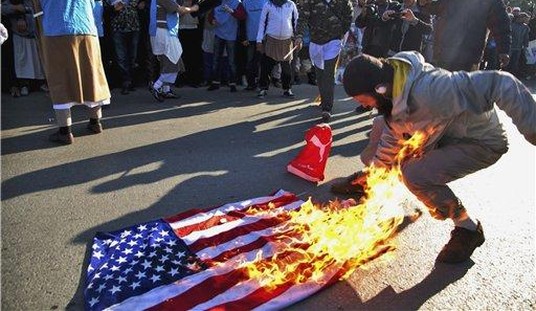I’ve been nibbling around the edges of the NYT’s 9-11 piece all day, between writing other posts and whatnot. If you haven’t read the piece it’s here, and its main thrust is that President George W. Bush was briefed on the al Qaeda threat and its intent to attack within the US far more extensively than has been disclosed previously. It says he was deaf to the threat.
But there are a couple of curious things about the piece that need to be taken into account. One, author Kurt Eichenwald claims to have seen the documents regarding those pre-9-11 briefings, but he posts none of them and his quotes from them are scant. Mostly, he describes them.
The direct warnings to Mr. Bush about the possibility of a Qaeda attack began in the spring of 2001. By May 1, the Central Intelligence Agency told the White House of a report that “a group presently in the United States” was planning a terrorist operation. Weeks later, on June 22, the daily brief reported that Qaeda strikes could be “imminent,” although intelligence suggested the time frame was flexible.
There actually isn’t much that would be news there. The June 22 briefing is internally contradictory, if Eichenwald’s description is accurate. How should a president respond to the possibility of an “imminent” attack that may be timed flexibly? What sort of attack was the “group presently in the United States” planning? Who were they?
Anti-terror efforts of the era would probably have focused on the use of explosives, ANFO most likely since Hizballah was known to use it. And they would have been completely misguided, as the 9-11 terrorists used no explosives at all. They exploited the culture that enables illegal aliens to obtain functional photo IDs, and they used utility knives.
In another section of his article, Eichenwald says the CIA warned that al Qaeda wanted to attack in a way that would have “dramatic consequences.” Doesn’t that describe pretty much all terrorist attacks? They don’t attack so that we will be bored, but in order to terrorize us. Terrorists are bloody drama queens.
The most damning section is probably the section on Iraq.
But some in the administration considered the warning to be just bluster. An intelligence official and a member of the Bush administration both told me in interviews that the neoconservative leaders who had recently assumed power at the Pentagon were warning the White House that the C.I.A. had been fooled; according to this theory, Bin Laden was merely pretending to be planning an attack to distract the administration from Saddam Hussein, whom the neoconservatives saw as a greater threat. Intelligence officials, these sources said, protested that the idea of Bin Laden, an Islamic fundamentalist, conspiring with Mr. Hussein, an Iraqi secularist, was ridiculous, but the neoconservatives’ suspicions were nevertheless carrying the day.
In response, the C.I.A. prepared an analysis that all but pleaded with the White House to accept that the danger from Bin Laden was real.
“The U.S. is not the target of a disinformation campaign by Usama Bin Laden,” the daily brief of June 29 read, using the government’s transliteration of Bin Laden’s first name.
We have to go back to the pre-9-11 world in order to understand why the president and his advisers might have believed al Qaeda was serving as a distraction for Iraq. Saddam Hussein regularly threatened his neighbors and the US forces in the region. He had already corrupted the United Nations oil-for-food program. Al Qaeda was a known threat, as was Hussein’s Iraq. Iraq had been wriggling out from under the UN’s thumb for years. It was far from unreasonable to see that the two might be working together against their common enemy, us. Post 9-11 it’s easy to say that they weren’t working together, though that isn’t altogether accurate.
Not addressed in Eichenwald’s article at all, is the infamous “wall” between intelligence and law enforcement, which was a creature of the Clinton years. That wall compartmentalized intelligence in ways that made preventing 9-11 all but impossible. Any article on the pre-9-11 failures that fails to mention Jamie Gorelick and her wall is insufficient at best.
Taken as a whole, Eichwald’s article reads like a defense of the CIA. It is written entirely from that agency’s perspective. The agency, or at least whoever in the agency talked with Eichenwald, wants it known all these years later that 9-11 was not their fault. They have leaked selectively to defend their record.
These may be the same grey personages who spent the Bush years waging an intel counter-war against the war in Iraq, via the likes of Valerie Plame’s husband and the numerous leaks that damaged the war effort.
It should be remembered that the CIA’s minds missed entirely the collapse of the Soviet Union until it was already happening, and which did not cover itself in glory on the question of Iraq’s weapons of mass destruction.









Join the conversation as a VIP Member